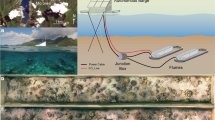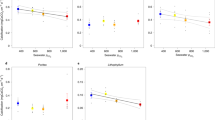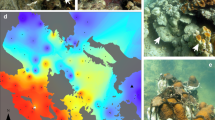Abstract
The in situ effects of ocean acidification on zooplankton communities remain largely unexplored. Using natural volcanic CO2 seep sites around tropical coral communities, we show a threefold reduction in the biomass of demersal zooplankton in high-CO2 sites compared with sites with ambient CO2. Differences were consistent across two reefs and three expeditions. Abundances were reduced in most taxonomic groups. There were no regime shifts in zooplankton community composition and no differences in fatty acid composition between CO2 levels, suggesting that ocean acidification affects the food quantity but not the quality for nocturnal plankton feeders. Emergence trap data show that the observed reduction in demersal plankton may be partly attributable to altered habitat. Ocean acidification changes coral community composition from branching to massive bouldering coral species, and our data suggest that bouldering corals represent inferior daytime shelter for demersal zooplankton. Since zooplankton represent a major source of nutrients for corals, fish and other planktivores, this ecological feedback may represent an additional mechanism of how coral reefs will be affected by ocean acidification.
This is a preview of subscription content, access via your institution
Access options
Subscribe to this journal
Receive 12 print issues and online access
$209.00 per year
only $17.42 per issue
Buy this article
- Purchase on Springer Link
- Instant access to full article PDF
Prices may be subject to local taxes which are calculated during checkout




Similar content being viewed by others
References
Broecker, W. S. & Clark, E. Glacial-to-Holocene redistribution of carbonate ion in the deep sea. Science 294, 2152–2155 (2001).
Caldeira, K. & Wickett, M. E. Anthropogenic carbon and ocean pH. Nature 425, 365 (2003).
Orr, J. C. et al. Anthropogenic ocean acidification over the twenty-first century and its impact on calcifying organisms. Nature 437, 681–686 (2005).
Feely, R. A., Doney, S. C. & Cooley, S. R. Ocean acidification: present conditions and future changes in a high-CO2 world. Oceanography 22, 36–47 (2009).
Richardson, A. J. In hot water: Zooplankton and climate change. ICES J. Mar. Sci. 65, 279–295 (2008).
Longhurst, A. R. Role of the marine biosphere in the global carbon cycle. Limnol. Oceanogr. 36, 1507–1526 (1991).
Bucklin, A. et al. in Life in the World’s Ocean (ed. McIntyre, A. D.) 247–265 (Blackwell Publishing, 2010).
Comeau, S., Gorsky, G., Jeffree, R., Teyssie, J. L. & Gattuso, J.-P. Impact of ocean acidification on a key Arctic pelagic mollusc (Limacina helicina). Biogeosciences 6, 1877–1882 (2009).
O’Donnell, M. J. et al. Ocean acidification alters skeletogenesis and gene expression in larval sea urchins. Mar. Ecol. Prog. Ser. 398, 157–171 (2009).
Sheppard Brennand, H., Soars, N., Dworjanyn, S. A., Davis, A. R. & Byrne, M. Impact of ocean warming and ocean acidification on larval development and calcification in the sea urchin Tripneustes gratilla. PLoS ONE 5, e11372 (2010).
Kurihara, H. & Ishimatsu, A. Effects of high CO2 seawater on the copepod Acartia tsuensis through all life stages and subsequent generations. Mar. Pollut. Bull. 56, 1086–1090 (2008).
Weydmann, A., Søreide, J. E., Kwasniewski, S. & Widdicombe, S. Influence of CO2-induced acidification on the reproduction of a key Arctic copepod. J. Exp. Mar. Biol. Ecol. 428, 39–42 (2012).
McConville, K. et al. Effects of elevated CO2 on the reproduction of two calanoid copepods. Mar. Pollut. Bull. 73, 428–434 (2013).
Hildebrandt, N., Niehoff, B. & Sartoris, F. J. Long-term effects of elevated CO2 and temperature on the Arctic calanoid copepods Calanus glacialis and C. hyperboreus. Mar. Pollut. Bull. 80, 59–70 (2014).
Gaylord, B. et al. Ocean acidification through the lens of ecological theory. Ecology 96, 3–15 (2015).
Hamner, W. M. & Carleton, J. H. Copepod swarms: attributes and role in coral reef ecosystems. Limnol. Oceanogr. 24, 1–14 (1979).
Christou, E. D. & Verriopoulos, G. C. Analysis of the biological cycle of Acartia clausi (Copepoda) in a meso-oligotrophic coastal area of the eastern Mediterranean Sea using time-series analysis. Mar. Biol. 115, 643–651 (1993).
González, J. G. Critical thermal maxima and upper lethal temperatures for the calanoid copepods Acartia tonsa and A. clausi. Mar. Biol. 27, 219–223 (1974).
Cervetto, G., Gaudy, R. & Pagano, M. Influence of salinity on the distribution of Acartia tonsa (Copepoda, Calanoida). J. Exp. Mar. Biol. Ecol. 239, 33–45 (1999).
Fabricius, K. E. et al. Losers and winners in coral reefs acclimatized to elevated carbon dioxide concentrations. Nat. Clim. Change 1, 165–169 (2011).
Andersson, A. J. & Gledhill, D. Ocean acidification and coral reefs: Effects on breakdown, dissolution, and net ecosystem calcification. Annu. Rev. Mar. Sci. 5, 321–348 (2011).
Enochs, I. C. et al. Shift from coral to macroalgae dominance on a volcanically acidified reef. Nat. Clim. Change 5, 1–9 (2015).
Alldredge, A. L. & King, J. M. Distribution, abundance, and substrate preferences of demersal reef zooplankton at Lizard Island Lagoon, Great Barrier Reef. Mar. Biol. 41, 317–333 (1977).
Carleton, J. H. Zooplankton and coral reefs: an overview. South Pacific Underw. Med. Soc. 23, 102–107 (1993).
Fabricius, K. E., Kluibenschedl, A., Harrington, L., Noonan, S. & De’ath, G. In situ changes of tropical crustose coralline algae along carbon dioxide gradients. Sci. Rep. 5, 9537 (2015).
Kurihara, H., Shimode, S. & Shirayama, Y. Sub-lethal effects of elevated concentration of CO2 on planktonic copepods and sea urchins. J. Oceanogr. 60, 743–750 (2004).
Isari, S., Zervoudaki, S., Saiz, E., Pelejero, C. & Peters, J. Copepod vital rates under CO2-induced acidification: a calanoid species and a cyclopoid species under short-term exposures. J. Plankton Res. 37, 912–922 (2015).
Fabricius, K. E., De’ath, G., Noonan, S. & Uthicke, S. Ecological effects of ocean acidification and habitat complexity on reef-associated macroinvertebrate communities. Proc. R. Soc. Lond. B 281, 20132479 (2014).
Rossoll, D. et al. Ocean acidification-induced food quality deterioration constrains trophic transfer. PLoS ONE 7, 2–7 (2012).
Johnson, V. R. Responses of marine benthic microalgae to elevated CO2 . Mar. Biol. 160, 1813–1824 (2013).
Munday, P. L. et al. Ocean acidification impairs olfactory discrimination and homing ability of a marine fish. Proc. Natl Acad. Sci. USA 106, 1848–1852 (2009).
Kim, H., Spivack, A. J. & Menden-Deuer, S. pH alters the swimming behaviors of the raphidophyte Heterosigma akashiwo: implications for bloom formation in an acidified ocean. Harmful Algae 26, 1–11 (2013).
Genin, A., Jaffe, J. S., Reef, R., Richter, C. & Franks, P. J. S. Swimming against the flow: a mechanism of zooplankton aggregation. Science 308, 860–862 (2005).
Hamner, W. M., Jones, M. S., Carleton, J. H., Hauri, I. R. & Williams, D. M. Zooplankton, planktivorous fish, and water currents on a windward reef face: Great Barrier Reef, Australia. Bull. Mar. Sci. 42, 459–479 (1988).
Ferrier-Pagès, C., Hoogenboom, M. & Houlbrèque, F. Coral Reefs: An Ecosystem in Transition (Springer Science, 2011); http://dx.doi.org/10.1007/978-94-007-0114-4
Houlbrèque, F. & Ferrier-Pagès, C. Heterotrophy in tropical scleractinian corals. Biol. Rev. 84, 1–17 (2009).
Edmunds, P. J. Zooplanktivory ameliorates the effects of ocean acidification on the reef coral Porites spp. Limnol. Oceanogr. 56, 2402–2410 (2011).
Towle, E. K., Enochs, I. C. & Langdon, C. Threatened Caribbean coral is able to mitigate the adverse effects of ocean acidification on calcification by increasing feeding rate. PLoS ONE e0123394 (2015).
Johannes, R. E. & Tepley, L. Examination of feeding of the reef coral Porites lobata in situ using time lapse photography. Proc. 2nd Coral Reef Symp. Vol. 19, 127–131 (The Great Barrier Reef Committee, 1974).
Wellington, G. M. An experimental analysis of the effects of light and zooplankton on coral zonation. Oecologia 52, 311–320 (1982).
Palardy, J. E., Rodrigues, L. J. & Grottoli, A. G. The importance of zooplankton to the daily metabolic carbon requirements of healthy and bleached corals at two depths. J. Exp. Mar. Bio. Ecol. 367, 180–188 (2008).
Barnett, T. P. et al. Penetration of human-induced warming into the world’s oceans. Science 309, 284–287 (2005).
Hays, G. C., Richardson, A. J. & Robinson, C. Climate change and marine plankton. Trends Ecol. Evol. 20, 337–344 (2005).
Whitney, F. A., Freeland, H. J. & Robert, M. Persistently declining oxygen levels in the interior waters of the eastern subarctic Pacific. Prog. Oceanogr. 75, 179–199 (2007).
Maas, A. E., Frazar, S. L., Outram, D. M., Seibel, B. A. & Wishner, K. F. Fine-scale vertical distribution of macroplankton and micronekton in the Eastern Tropical North Pacific in association with an oxygen minimum zone. J. Plankton Res. 36, 1557–1575 (2014).
Roemmich, D. & McGowan, J. Climatic warming and the decline of zooplankton in the California current. Science 267, 1324 (1995).
Kattner, G. & Fricke, H. S. G. Simple gas-liquid chromatographic method for the simultaneous determination of fatty acid and alcohols in wax esters of marine organisms. J. Chromatogr. A 361, 263–268 (1986).
Hagen, W. in ICES Zooplankton Methodology Manual (eds Harris, R., Wiebe, P., Lenz, J., Skjoldal, H. & Huntley, M.) 113–119 (Academic, 2000).
Lewis, E. & Wallace, D. ORNL/CDIAC-105 Carbon Dioxide Information Analysis Center (US Department of Energy, 1998).
Dickson, A. G. & Millero, F. J. A comparison of the equilibrium constants for the dissociation of carbonic acid in seawater media. Deep-Sea Res. 34, 1733–1743 (1987).
Acknowledgements
The authors thank crew members of the M/V Chertan for help in the field, in particular O. Daniel and R. Luke, along with other members of the Hamamas Team. We also thank the community of Upa-Upasina and Dobu Island for permission to study zooplankton in their reef. Additional thanks to S. Noonan from the Australian Institute of Marine Science for logistical support, and H. Auel and P. Wencke from Bremen University for laboratory help and advice for the biochemical analysis. This project was funded in part by the Erasmus Mundus funded joint doctoral programme MARES (FPA 2011-0016), the Great Barrier Reef Foundation’s ‘Resilient Coral Reefs Successfully Adapting to Climate Change’ programme in collaboration with the Australian Government, the BIOACID Phase II Programme of the German Science Ministry BMBF (Grant 03F0655B), and the Australian Institute of Marine Science.
Author information
Authors and Affiliations
Contributions
J.N.S., K.E.F., C.R. and A.C. designed the experiment. J.N.S. and K.E.F. carried out the fieldwork. J.N.S. performed the laboratory work. G.D., J.N.S. and K.E.F. carried out the statistical analysis. All authors contributed to writing the manuscript.
Corresponding author
Ethics declarations
Competing interests
The authors declare no competing financial interests.
Supplementary information
Supplementary Information
Supplementary Information (PDF 267 kb)
Rights and permissions
About this article
Cite this article
Smith, J., De’ath, G., Richter, C. et al. Ocean acidification reduces demersal zooplankton that reside in tropical coral reefs. Nature Clim Change 6, 1124–1129 (2016). https://doi.org/10.1038/nclimate3122
Received:
Accepted:
Published:
Issue Date:
DOI: https://doi.org/10.1038/nclimate3122
This article is cited by
-
The indirect effects of ocean acidification on corals and coral communities
Coral Reefs (2022)
-
Changes in the metabolic potential of the sponge microbiome under ocean acidification
Nature Communications (2019)
-
Neustonic copepods (Labidocera spp.) discovered living residentially in coral reefs
Marine Biodiversity (2019)
-
Temperature and feeding induce tissue level changes in autotrophic and heterotrophic nutrient allocation in the coral symbiosis – A NanoSIMS study
Scientific Reports (2018)
-
Eating in an acidifying ocean: a quantitative review of elevated CO2 effects on the feeding rates of calcifying marine invertebrates
Hydrobiologia (2018)



